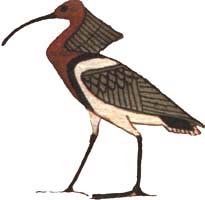
Akh
(akh)
Appearance: The akh was depicted as a crested ibis. However, there is probably only a phonetic relationship between the bird and the concept.
Meaning: In the world of the living, the akh most commonly referred to the "effectiveness" of kings or officials, who operated on behalf of their gods or kings (respectively). Anyone though could be akh-effective or do akhu-effective deeds. These deeds did not need to be glorious or useful, but simply concrete acts that affected eternity and helped maintain ma'at. For example, when Pharoah Senwosret I in his role as Horus, the son of Osiris, he built monuments to his divine father and made offerings. He wrote that he was "doing that which is akh-effective." Oudjahorresne performed akhu-acts for his townspeople by defending the weak, saving the troubled and protecting them as he would protect his children.
In the realm of the Afterworld, akh was the deceased who became an effective being by being supplied with all of the necessary offerings and who knew the necessary spells. One became an akh through a ritual appropriately titled, "Cause One to Become an Akh." This ritual was performed by a priest called the "akh-seeker" (skhen-akh). Those deceased who have become akhu can still act for or against the living, and exist with them in a reciprocal relationship. If the living care and maintain the deceased, the deceased can care and protect the living.
Digg This!
![]() Del.icio.us
Del.icio.us
![]() Stumble Upon
Stumble Upon
